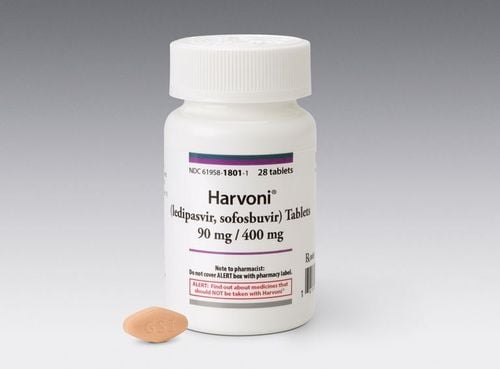This is an automatically translated article.
Bilavir is a prescription drug, with high activity, especially against hepatitis B virus. To ensure the effectiveness of using Bilavir, patients need to follow the instructions of a specialist doctor and refer to more information in article below.
1. What does Bilavir do?
1.1 What is Bilavir? Bilavir belongs to the group of drugs that treat parasites, infections, viruses and fungi. The drug has registration number VD-13334-10, manufactured by Binh Dinh Pharmaceutical and Medical Equipment Company (BIDIPHAR). The active ingredient is Lamivudin 100mg.
Bilavir is prepared in the form of a film-coated tablet of 10 blisters, a box of 1 blister or a box of 3 blisters.
Bilavir is recommended for use in adults and children (can be used for children from 3 months old depending on the condition of the child).
1.2. What does Bilavir do? Bilavir is an antiviral drug indicated for use in:
Chronic hepatitis B with evidence of hepatitis B virus (HBV) replication with 1 or more of the following conditions: Liver enzyme levels Serum ALT 2 times higher than normal. Compensated cirrhosis or decompensated cirrhosis. Necrotizing inflammatory liver disease may show up on biopsy results. Immunodeficiency syndrome. Had liver transplant surgery. Bilavir alone can significantly improve necrotizing liver function, reduce liver fibrosis, and increase serum hepatitis B antigen (HBsAg). Bilavir is also used in combination with another reverse transcriptase inhibitor Dideoxynucleoside in the treatment of HIV-infected patients, usually in combination with Stavudine or Zidovudine. The drug is contraindicated in the following cases:
Patients are allergic to the main active ingredient Lamivudin or any of the excipients of the drug. Patients with severe kidney disease
2. How to use Bilavir
2.1. How to take Bilavir medicine Bilavir is taken orally. Patients should choose a fixed time of day to take the medicine. If you have to drink 2 times, it should be taken at 2 times of the day, morning and evening. Take Bilavir tablets whole with cooled boiled water, do not crush, crush or mix the medicine with any other mixed solution. Follow the instructions and instructions of the treating doctor. Do not arbitrarily increase or decrease the prescribed dose. 2.2. Dosage of the drug Bilavir Adults and children > 12 years old:
Recommended oral dose: 100mg x 1 time per day. Note: Discontinue use in patients with a normal immune response where HbsAg and/or HBeAg seroconversion occurs. Children under 12 years:
3 mg/kg body weight x 1 time per day, (maximum no more than 100 mg/day) HIV-infected patients:
Adults and adolescents 16 years of age and older:
Weight ≥ 50 kg : 150mg Bilavir and 300mg Zidovudine, every 12 hours. Weight < 50 kg: 2 mg of Bilavir/kg body weight and 4 mg of zidovudine/kg body weight, every 12 hours. Adolescents 12 years and older up to 16 years:
Weight ≥ 50kg: 150mg of Bilavir and 300mg of Zidovudine, every 12 hours. Weight < 50kg: No data available Children 3 months to 12 years: 4mg Bilavir/kg body weight, every 12 hours. Maximum dose should not exceed 300mg Bilavir per day. Patients with renal impairment : Dosage adjustment is required (dose for patients 16 years of age and older). CrCl index from 30 to 49: 150 mg x 1 time / day CrCl index from 15 to 29: First day 150mg; days after 100mg, once a day. CrCl index from 5-14: The first day 150mg. The days after 50mg, take 1 time a day. CrCl index from < 5: The first day 50mg; the days after 25mg, take 1 time a day. Patients with chronic hepatitis B:
Adults: 100mg, once a day. Children over 2 years old: 3mg/kg body weight, once a day. No more than 100mg/day. Patients with renal impairment: The dose of Bilavir must be reduced as directed by the physician. Patients co-infected with HIV and hepatitis B virus: Use according to the dose of antiretroviral HIV.
How to handle when missed dose, overdosage of Bilavir:
In case of missed dose of Bilavir, it is advisable to supplement as soon as possible. However, if it is almost time for the next dose, skip the missed dose of Bilavir and use a new dose. When using Bilavir overdose, the patient needs to stop the drug immediately and go to the nearest medical facility for timely treatment.
3. Notes when taking Bilavir
After discontinuing Bilavir, patients may still experience a relapse of chronic hepatitis B. Therefore, it is necessary to periodically monitor clinical and evaluate liver function in serum at least every 4 months to find evidence of recurrent viral hepatitis and take timely treatment measures. A maintenance dose of Bilavir 150 mg twice daily is necessary in patients with concomitant HIV infection. In children with a history of pancreatitis or risk factors for developing pancreatitis. When bilavir and zidovudine are used in combination, close monitoring is required. If clinical signs or abnormal laboratory results suggest pancreatitis, the drug should be discontinued immediately. In patients with impaired renal function, children < 12 years of age and adolescents weighing less than 50 kg, the combination of bilavir and zidovudine should not be used, because the individual drugs cannot be adjusted. HIV is an immunodeficiency syndrome that will follow the patient for life, Bilavir has no effect on HIV infection, the patient continues to carry the disease and including opportunistic infections. At the same time, Lamivudine does not reduce the risk of HIV transmission, it is recommended that patients still use condoms to protect sexual partners. Do not drive or operate machinery while taking Bilavir because of side effects such as dizziness and headache. Pregnancy: Bilavir can be used alone during pregnancy, especially when there is a chance of protection from hepatitis B virus transmission to the fetus. In the case of taking Lamivudine in combination with oral administration (Lamivudine and Zidovudine tablets), it is not recommended for pregnant women. Lactation: Although there are no studies on whether Lamivudine is excreted in human milk, the possibility of undesirable effects due to Lamivudine in breastfed infants has not been studied. Therefore, Bilavir should not be used in women who are breastfeeding, in addition, there is also a high risk of HIV transmission from breastfed babies.
4. Side effects of the drug Bilavir
At therapeutic doses, Bilavir is well tolerated. However, the process of using Bilavir, patients may still experience side effects such as:
Common:
Headache, irritability, fatigue, pain, dizziness, insomnia, depression, fever, chills tremor, nausea, vomiting, anorexia, abdominal pain, dyspepsia, diarrhea, increased amylase, peripheral neuropathy, paresthesia, nasal signs and symptoms, cough, skin rash, myalgia, arthralgia , neutropenia, anemia, increased AST and ALT. Uncommon: Pancreatitis, hyperbilirubinemia, thrombocytopenia.
Special: Bilavir should be discontinued immediately if symptoms, clinical signs, or laboratory findings suggest possible pancreatitis.
If you experience these symptoms, the patient should stop using Bilavirg and notify the doctor for appropriate treatment.
5. Bilavir drug interactions
Zidovudine plasma concentrations are significantly increased (approximately 39%) when used in combination with preparations containing Lamivudine. Sulfamethoxazole/Trimethoprim increases the bioavailability of the active ingredient Lamivudine (by 44%) as measured by the AUC value of the concentration-time curve and reduces the renal clearance of the drug (30%). . Although AUC values were not significantly affected, absorption of Lamivudine was slowed and peak plasma concentrations were 40% lower when the drug was administered to patients with a full meal than when the drug was administered in the fasted state. To avoid interactions, before being prescribed Bilavir, the patient should inform the doctor about the drugs they are using, including dietary supplements. The doctor will base on that to prescribe the appropriate Bilavir.
6. How to store Bilavir
The shelf life of Bilavir is 36 months from the date of manufacture. Store Bilavir medicinal products at an ideal temperature below 25 degrees Celsius. Do not expose the medicine to direct sunlight, places with high temperatures such as next to refrigerators, heaters or televisions. Avoid storing medicine in humid places such as bathrooms, where humidity is higher than 70%. Keep medication out of reach of small children. Above is all information about Bilavir, patients need to carefully read the instructions for use, consult a doctor / pharmacist before using. Note, Bilavir is a prescription drug, patients absolutely must not buy and treat at home because they may experience unwanted side effects.













